The Dead End Kids were a group of young actors from New York City who appeared in Sidney Kingsley's Broadway play Dead End in 1935. In 1937, producer Samuel Goldwyn brought all of them to Hollywood and turned the play into a film. They proved to be so popular that they continued to make movies under various monikers, including the Little Tough Guys, the East Side Kids, and the Bowery Boys, until 1958.
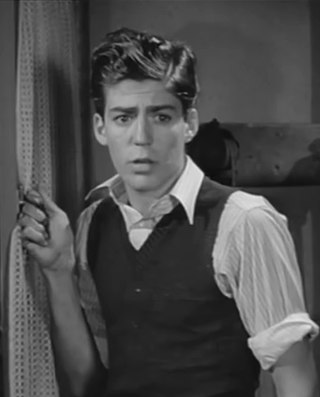
William Halop was an American actor.
The Little Tough Guys were a group of actors who made a series of films and serials released by Universal Studios from 1938 through 1943. Many of them were originally part of The Dead End Kids, and several of them later became members of The East Side Kids and The Bowery Boys.
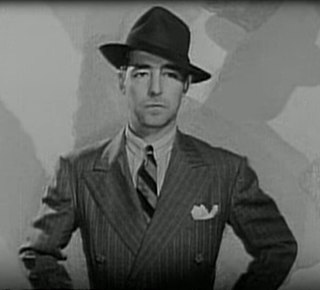
Kenne Duncan was a Canadian-born American B-movie character actor. Hyped professionally as "The Meanest Man in the Movies," the vast majority of his over 250 appearances on camera were Westerns, but he also did occasional forays into horror, crime drama, and science fiction. He also appeared in over a dozen serials.
Junior G-Men was an American boys club and popular culture phenomenon during the late 1930s and early 1940s that began with a radio program and culminated with films featuring the Dead End Kids.

King of the Texas Rangers (1941) is a Republic film serial. Set in the years prior to America entering World War II, the plot is slightly anachronistic in that the serial features a mix of period western and modern elements, which was not unknown in the B-Western films also produced by Republic. Although the serial's plot involves cowboys battling Axis agents in Texas. Nazis are never named as such but their presence is strongly implied within the serial.

Federal Operator 99 is a 1945 American movie serial from Republic Pictures. It was later edited down into a feature version titled F.B.I. 99 for television. The serial is about an FBI agent named Jerry Blake who battles gentleman thief Jim Belmont, who escapes custody with help of his gang and begins a wave of crimes, beginning with plotting to steal the crown jewels of the Princess Cornelia.

G-Men Never Forget is a 1948 American movie serial from Republic Pictures. The serial was condensed into a 100-minute feature film in 1966 under the title Code 645.

Heroes of the West (1932) is a Universal Pre-Code movie serial that depicts the dangers and thrills of building a transcontinental railroad. This was the 82nd serial to be released by Universal. It was remade in 1938 as Flaming Frontiers (serial).

The Lost Special is a 1932 American Pre-Code Universal movie serial based on the 1898 short story "The Lost Special" by Arthur Conan Doyle. This adaptation deleted all references to Doyle's Sherlock Holmes character, and moved events to the American Old West.

The Phantom Rider is a 1936 American Western film serial directed by Ray Taylor for Universal and starring Buck Jones and Marla Shelton.
Secret Agent X-9 (1937) is a Universal film serial based on the comic strip Secret Agent X-9 by Dashiell Hammett and Alex Raymond.

Junior G-Men of the Air is a 1942 Universal film serial starring the Dead End Kids and the Little Tough Guys. A group of youthful flying enthusiasts join the "Junior G-Men" to help break up a planned attack on the United States.

Sky Raiders is a 12-episode 1941 Universal film serial. The serial was directed by Ford Beebe and Ray Taylor. Sky Raiders stars Donald Woods, Billy Halop, Robert Armstrong and Eduardo Ciannelli. Sky Raiders has little in common with Universal’s other early-1940s espionage outings like Sea Raiders or Junior G-Men, although the serial is often lumped in together as if it is part of a series.

Sea Raiders is a 1941 Universal film serial starring the Dead End Kids and Little Tough Guys. This was the teen stars' second of three serials, between Junior G-Men (1940) and Junior G-Men of the Air (1942). Sea Raiders was the 52nd serial to be released by Universal. The plot concerns the heroes foiling Nazi attacks on American shipping.
Don Winslow of the Navy is a 1942 Universal Pictures Serial film based on the comic strip Don Winslow of the Navy by Commander Frank V. Martinek. It was theatrically released in January 1942.
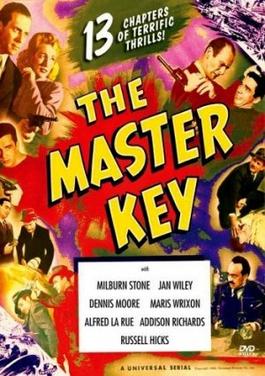
The Master Key is a 1945 Universal movie serial, directed by Lewis D. Collins and Ray Taylor. It starred Milburn Stone, Dennis Moore and Byron Foulger. This serial also featured the screen debut of future western film star Lash LaRue.
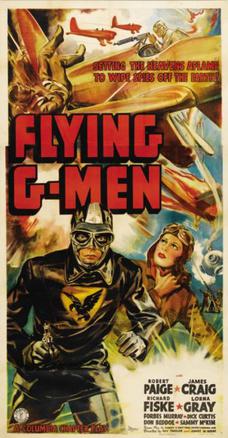
Flying G-Men is a 15-episode 1939 adventure film Film serial, directed by James W. Horne and Ray Taylor. The serial was the sixth of the 57 serials released by Columbia. Four "Flying G-Men" battle with enemy saboteurs intent on destroying American military defences.

The Secret Code (1942) was the 19th serial released by Columbia Pictures. It features the masked hero "The Black Commando" facing Nazi saboteurs, inspired by Republic Pictures' successful Spy Smasher serial of the same year. The chapters of this serial each ended with a brief tutorial in cryptography.
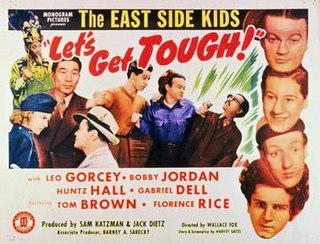
Let's Get Tough! is a 1942 film and the ninth film in the East Side Kids series, starring Leo Gorcey, Huntz Hall, Bobby Jordan, and Robert Armstrong. Released in early 1942, it was directed by Wallace Fox, and features the gang caught up in World War II and fighting the Black Dragon Society, an enemy sabotage ring.














